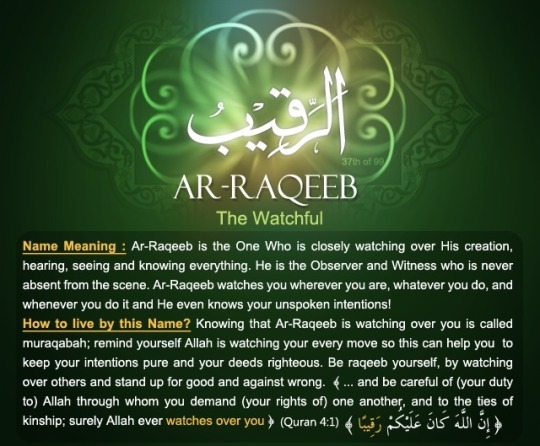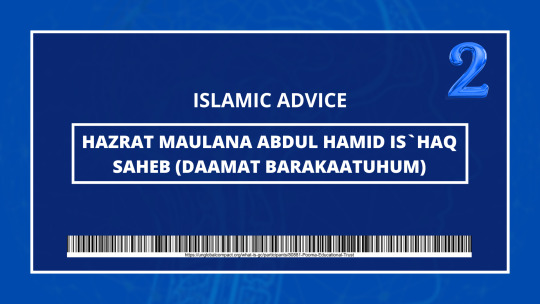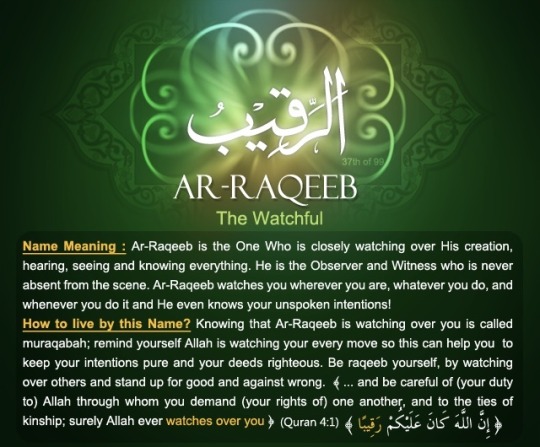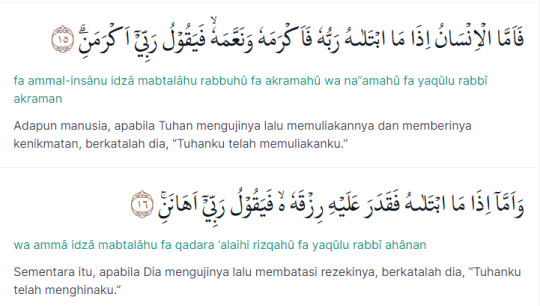#muraqabah
Text
When asked the meaning of self-vigilance [murāqabah], 'Allāmah Tabātabā'ī answered, "Self-vigilance is to be attentive inwardly towards God, and to turn to Him in all states. It is through this virtue that a wayfarer may approach, or perhaps attain, their goal. It means being mindful of God from the morning when one wakes up, until the night when one goes to bed. Thus, whatever the person says or does is in accordance with Godly values. It is to perceive that God is omnipresent; that He sees whatever one does and knows whatever one thinks. It is to feel that one is in the warm presence of God. Self-vigilance is the key to all spirituality. Without proper self-vigilance, any other practice or instruction in the spiritual path will be close to void and ineffective."
15 notes
·
View notes
Text
✨Meditação "Allāh Hū" com Luz✨
✨Meditação "Allāh Hū" com Luz✨
Por Mestre Mohammad Abdullah Ansari
⠀
⠀
Você já viu um átomo? Na verdade não, mas você viu desenhos ou representações de como provavelmente ele é: um núcleo (nêutrons e prótons) e os elétrons que circulam mais ou menos como o sistema solar. Se imaginarmos que o núcleo é do tamanho de uma bola de golfe, o primeiro elétron estaria a um quilômetro de distância dele, a segunda camada ou órbita de elétrons estaria a quatro quilômetros de distância e o terceiro conjunto de elétrons em órbita estaria a nove quilômetros do núcleo.
Além da ciência não considerar que haja matéria/substância em um átomo (é mais ar que “coisa”) seu núcleo é 10.000 vezes menor que o diâmetro do átomo.
Nosso corpo, e na verdade tudo o que existe, é composto de átomos. Se o átomo é mais ar que matéria, o que somos nós? Por que tudo parece sólido? O fato é que a solidez do mundo é uma ilusão criada por nossos sentidos, dados por Deus, para vivermos aqui neste mundo e para cumprir nossa missão na Terra.
Para entender a realidade desta vida é preciso vivenciar uma espécie de dualidade em que acreditamos e agimos no mundo sólido mas ao mesmo tempo temos que estar conscientes até vermos e sentirmos sua natureza verdadeira – a unidade e interconexão de tudo.
⠀
⠀
A meditação a seguir pode nos dar uma experiência dessa realidade:
⠀
☝Sente-se como você se senta ou sentaria para meditar.
☝Comece a observar, com toda atenção, a respiração.
☝Visualize o ar como vapor, entrando e saindo, entrando e saindo. Concentre-se no ar, sinta o ar entrando e saindo, entrando e saindo.
☝Ao inalar, diga, mentalmente, 'Allāh'. Ao expirar, diga 'Hū' (pronuncia-se "ru" como em rua, que significa Ele, referindo-se a Deus).
☝Quando se sentir confortável com o acima mencionado e a expressão mental "Allāh Hū" (ru) for automática, como se você não tivesse que pensar nisso, comece a visualizar o ar ao inalar como uma Luz branca entrando pelo ponto coronal, a parte mais alta da cabeça.
☝Ao exalar, visualize o ar/luz deixando o corpo por cada poro.
☝Sinta que o corpo está perdendo sua solidez e que os elementos do corpo, os átomos, estão se separando, se expandindo, enchendo a sala, a cidade, o mundo ou até o universo.
☝Respire devagar e com calma, sem força. A expressão “Allāh Hū” segue por si mesma.
☝Concentre-se na expansão e contração dos átomos do corpo e na Luz.
☝Continue assim por, digamos, vinte minutos para começar e vá aumentando o tempo de acordo com sua habilidade de concentração

#zensufi#zensufismo#zensufism#zensuffiyya#sufi#sufismo#sufism#buddallah#buddislam#fremen#religião dos fremen#fremen faith#duna#meditação sufi#muraqaba#muraqabah
0 notes
Text
youtube
#love allah#meditation#islam#allah#tafakkur#sufism#al quran#inspiration#naqashbandi#sufis#muraqabah#muslim#muhammad pbuh#prophet muhammed pbuh#energy#Youtube
0 notes
Text
Makin Dekat
harisanusi.com – “Dan apabila hamba-hamba-Ku bertanya kepadamu (Muhammad) tentang Aku, maka (jawablah), sesungguhnya Aku adalah dekat. QS.Al Baqarah : 186. Demikianlah, Allah menegaskan kehadirannya bersama para abdiNya. Dekat. Sangat dekat. Lebih dekat dari urat lehernya sendiri. Bahkan berada diantara antara seorang manusia dengan hatinya. Sehingga, apapun hasrat dan keinginan tersembunyi dari…

View On WordPress
0 notes
Text

Allah calls Himself Ar-Raqeeb— The Watchful, The All-Observing, The Witness— on three occasions in the Quran. Ar-Raqeeb is the One Who sees what is hidden in the hearts and He is the One Who charges your soul for what it has earned. He is the All-and-Ever-Watchful, observing everyone’s actions, thoughts, and feelings. Ar-Raqeeb is also The Controller; preserving and organizing the affairs of creation with the perfect planning!
The Watcher, The Observer, and The Controller
Raqeeb comes from the root raa-qaaf-baa, which points to three main meanings. The first meaning is to look, watch, observe, and be vigilant. The second main meaning is to erect in order to care for something. Raqeeb is the one who takes charge, which includes protecting, maintaining, and preserving. The third is to regard, to hold in consideration and respect.
This root appears 24 times in the Quran in six derived forms. Examples of these forms are raqabatin (“a slave”), raqeebun (“an observer”), fartaqib (“so watch”) and laa yarquboona (“they do not respect (the ties) ”).
In the Arabic language raqeeb means is the one who watches over or supervises things. That includes raqeeb al-jaysh (sergeant) who guards and protects, and raqeeb al-qawm who guards the people. [See: Lisaan al-‘Arab under ‘raqiba’] A marqab is a high place on which someone is on guard to observe what is beneath and ar-raqaba is the neck, because it is erect.
Ar-Raqeeb Himself says: Surely, Allah is Ever an All-Watcher over you.[Quran 4:1] And Allah is Ever a Watcher over all things [Quran 33:52] and . . . but when You took me up, You were the Watcher over them; and You are a Witness to all things. [Quran 5:117].
A beautiful example of belief in Ar-Raqeeb
Narrated `Abdullah ibn Zayd ibn Aslam, from his father, from his grandfather, who said: When I was accompanying `Umar ibn al-Khattab on his patrol of Madinah at night, he felt tired, so he leant against a wall. It was the middle of the night, and (we heard) a woman say to her daughter, “O my daughter, get up and mix that milk with some water.” The girl said, “O Mother, did you not hear the decree of Amir al-Mu’minin (chief of the believers) today?” The mother said, “What was that?” The girl said, “He ordered someone to announce in a loud voice that milk should not be mixed with water.” The mother said, “Get up and mix the milk with water; you are in a place where `Umar cannot see you.” The girl told her mother, “I cannot obey Him (Allah) in public and disobey him in private.” [Sifat al-Safwah and Wafiyat al-A’yan and cited by Ibn al-Jawzi in Ahkam al-Nisa’]
This is an example of how we should understand and be aware of Ar-Raqeeb. This young woman was upright in her deeds, in public and private, because she believed that Allah was observing her at all times! The righteous leader ‘Umar Ibn Abdul-Azeez descended from her!
How Can You Live By This Name?
1. Know that you are never alone.
A scholar in the past advised: “Repeat the following statement whenever you go to bed, wake up or go out, “Allah looks at me; Allah watches me; Allah witnesses me”. Knowing that Ar-Raqeeb is watching over you is called muraqabah; remind yourself Allah is watching your every move, feel His presence and converse with Him, making dua to Him to keep your intentions pure and your deeds upright. When someone you look up to is watching you, you always try harder, what about Allah? So next time give extra sadaqah, pray on time and read the Quran more and impress Ar-Raqeeb!
2. Mind your words.
Some of us might stay away from the major sins, such as adultery and interest, but we daily commit thousands of sins with the way we speak and what we speak about. Be inspired by Ar-Raqeeb to mind every word you speak and ask yourself: does this speech please Allah or make Him angry? Allah says: Man does not utter any word except that with him is an observer prepared [to record]. [Quran, 50:18]
3. Remember Ar-Raqeeb when you are tempted.
One day Umar ibn al-Khattab radiyallahu ‘anhu found a shepherd and asked if the boy would sell him a sheep. The boy replied that it was not his. `Umar ibn al-Khattab made him an offer to see how he would react, He said: “If your master asks you, tell him that the sheep was eaten by a wolf.” He looked at him and said, “And what would I say to Him (i.e. Allah)?” `Umar cried and said, “By Allah, you are right. What would you say to Him?” Whenever you feel tempted to something haraam or not doing something Allah wants from you (like praying, wearing hijab etc) think about Ar-Raqeeb watching you; would you dare to look up to the sky and say ‘no’ to Allah? A’udhubillah!
4. Be raqeeb to yourself.
Be raqeeb yourself, by watching over others and stand up for good and against wrong. And be on the watch for the Shaytan and his tricks!
5. Supplicate to Ar-Raqeeb .
When the Prophet Yunus ‘alayhi sallam was all alone in the whale, what did he say? Then he called out in the darkness (saying), “There is no god except You. All Extolment be to You! Surely, I have been of the unjust. [Quran, 21:87]
Memorize this dua and supplicate with it to Ar-Raqeeb: The Prophet Yunus was all alone and He sought forgiveness from the One Who was watching Him all along. Next time when you are all alone, whether it be psychically because you are stuck somewhere, or mentally because you feel down, seek forgiveness from Ar-Raqeeb and He will give you a way out!
Wallahu ta’alaa ‘alem.
O Allah, Ar-Raqeeb, we know that You watch over and control all things. Guide us to be watchful over our hearts and our obligations towards you, adorn us with ihsaan, worshiping you as though we see You for if we don’t see you, You surely see us, aid us in purifying our intentions, help us remember Your watchfulness over us, and make this awareness an inspiration for us to increase our good deeds and stay away from our bad habits, ameen!
#allah#islam#revert help team#asma al husna#revert help#muslim#ayat#daily#allah’s name#dua#pray#prayer#salah#muslimah#hijab#reminder#religion#Mohammed#new muslim#new revert#new convert#how to convert islam#converthelp#convert islam#become a muslim#welcome to islam#daily ayat#prophet#god#revert
13 notes
·
View notes
Text
Muraqabah
Sadar gak sih kalau manusia itu lemah suka berulang kali bikin kesalahan. Sampai ada pepatah bilang, jangan sampai jatuh di lubang yang sama. Pepatah itu secara tidak langsung mengartikan kalau manusia suka berbuat salah, dan yang paling mengherankan melakukan kesalahannya, yang sama. Jadi yaa harus sadar.
Kesadaran ini gak datang begitu aja, harus ada upaya. Sebentar, walau manusia seadainya terhindar dari dosa besar, pasti tidak akan luput dengan dosa kecil. Manusia itu lemah dan rapuh tehadap godaan setan. Jadi ya harus apa? Harus sadar.
Kesadaran itu ada, karena ada upaya. Iya upaya, upaya diri yang selalu merasa diawasi sama Allah. Nah loh, takut gak? Ya harusnya sih takut. Oh iya upaya ini namanya "Muraqabah". Muraqabah ini membuat kita jadi waspada dan selalu mengawasi diri dari perilaku yang tidak sebagaimana mestinya.
Kalau udah diterapkan Muarqabah ini di dalam diri, kita enggan tuh malakukan hal-hal yang membuat dosa. Istilahnya mah, malu lah. Allah itu Maha Mengetahui, kadang kitanya aja yang pura-pura gak tahu. Gak bahaya ta?
01/09/23
9 notes
·
View notes
Text
Jika iman lemah, entah perjanjian seserius apapun, once you break the rule, you’re only entitled smart for breaking rules.
Ini bukan sekedar perkara someone who’s ‘confidently’ breaking rules.
Saya hanya terkejut pada orang-orang yang sudah dapat gelar kehormatan, distinction, prize di akademiknya tapi mudah sekali ingkar janji; ingkar janji pada negara, ingkar janji pada rakyat.
Jangan pilih pemimpin masa depan yang seperti itu, kalau masih sekolah pun sudah berani ‘main kotor’, kalau selepas sekolah pun masih berani ‘main kotor’.
Jangan mau dikelola orang pintar yang seperti itu. Mereka hanya mementingkan kepentingan-kepentingan pribadi mereka saja dengan beribu macam dalih untuk membenarkan alasan mereka.
Ini bukan sekedar perkara those who ‘confidently’ breaking rules,
Ini perkara ‘awardee’ yang enggan kembali.
Itu kenapa urgency belajar tauhid jadi sangat jelas terlihat.
Poin dimana gerak-gerik kita sebetulnya diawasi Allah, luntur hanya karena materi, karir, kebanggaan akan status dan kecerdasan. Poin ‘merasa diawasi’ itu hilang. With that audacity, that’s why orang-orang sangat berani ‘ingkar janji’.
Kita tak kenal siapa Rabb kita.
Dengan angkuhnya kita berjalan kesana-kemari sekehendaknya, melakukan perbuatan-perbuatan licik tanpa merasa terawasi.
Tak ada muraqabah disana. Hilang.
Coba kita renungkan ini tuan dan puan yang terhormat,
Bukankah orang-orang yang berjanji namun tidak ditepati itu termasuk salah satu ciri orang munafik dalam Islam?
Apa ancaman Allah untuk orang-orang munafik itu?
Hidup hanya sebentar tuan dan puan.
Anda akan mati. Saya pun juga.
Apakah kita tak tergiur dengan sebuah tempat pulang yang baik yang menjadi sebaik-baik tempat istirahat?
Apakah kita tak tergiur dengan sebuah tempat yang bernama surga?
Tidakkah kita mau berusaha untuk menempuh sebab-sebab agar kita bisa memasukinya?
Hidup ini hanya sebentar, tuan dan puan.
Anda akan mati, saya pun juga.
3 notes
·
View notes
Text
ISLAM 101: SPIRITUALITY IN ISLAM: PART 68
INITIATION
Initiation into a Sufi order is seen as a necessary ritual that transmits the spiritual grace (barakah, spiritual power) of the guide (murshid) to the disciple (Mureed). This special grace goes back in an unbroken line to the Prophet himself. In Sufi thought it is likened to a seed planted in the initiate’s soul, the equivalent of Christian baptism or new birth. At the initiation ceremony the Master who has experienced union with God and annihilation of self, in addition to giving the disciple the special garment also gives the him a secret word or prayer to help him in his meditation.
Sufis also believe in Spiritual Guides who reveal themselves to the Sufi in visions or dreams and help him on his path. Al-Khidr is one well known such guide who is sometimes identified as the prophet Elijah.
The initiate has to learn spiritual poverty (faqr) which means emptying the soul of self in order to make room for God. The illusion of the individual ego must be erased by humility and love of one’s neighbour. This is attained by a rigid self discipline that removes all obstacles to the revelation of the Divine Presence. Subtle Centres of Consiousness (Lata’if) It is generally thought that the human body contains only one subtle center of consciousness: the mind or brain. But the elder Sufis, through their spiritual experiences, discovered additional centers of perception or inner senses which they referred to as lata’if (singular: latifah). They further concluded based on their kashf (intuitive insight) that there are ten such lata’if.
The lata’if were luminous initially. When God connected them to the body, their light started to be filtered through the influences of the physical world, including human beings’ tendency to identity with materiality. The dimming of our natural inner radiance is reflected in the Qur’anic passage, Surely We created the human being of the best stature, then We reduced him to the lowest of the low, except those who believe and do good works, for they shall have a reward unfailing. (Qur’an 95:4-6).
Through practices that involve concentrating on the lata’if the Sufi aspirant becomes able to use them as means to greater awareness of the Divine Presence. The more the seeker develops this ability, the less the light of knowledge is obscured.
Like the faculty of memory, the lata’if are faculties that we may sense and experience, yet have difficulty explaining. How would you define memory? You might say it resides in the brain – you might even describe its physiological working – but these descriptions fail to convey all its dimensions. Sometimes, a person loses his or her memory due to injury. He or she becomes even more aware of its importance, yet is no better able to explain it. Similarly, the lata’if cannot be adequately defined in words; but as a person brings them to light, he or she comes to understand them.
Different Sufi orders have associated the lata’if with various locations on the body. The Naqshbandi- Mujaddidi order places the five centers of the world of God’s command (the lata’if of ‘alam’i amr) in the chest. The heart or qalb is on the left side of the body, two inches below the nipple. The spirit, ruh, is in the corresponding position on the right side of the chest. The subtle center known as secret, or sirr, is on the same side as the heart, but above the breast. Hidden (khafi) is on the right above the breast. Most hidden (akhfa) is in the middle of his chest, between the heart and spirit.
Shaykhs of the Naqshbandi-Mujaddidi order guide the salik (spiritual traveler) in enlightening the lata’if one by one. This is accomplished primarily through muraqabah (meditation). While sitting, the student makes an intention (niyah) to pay attention to a particular subtle center. He or she focuses first on the heart (qalb), then, in sequence, the other lata’if of the world of God’s command: spirit, secret, hidden, and most hidden (ruh, sirr, khafi, and akhfa). When these are fully enlightened, the student pays attention to the lata’if associated with the world of creation (‘alam’i khalq).
Of the subtle centers connected with the world of creation, only the self or nafs is regarded as corresponding to a particular point on the human body. Its location is in the middle of the forehead. It is the first of the lata’if of ‘lam’i khalq that the student refines, for it is considered the sum total of all the others. After concentrating on the self for some time, the student is guided next to focus on the four gross elements of which the body is constituted – air, fire, water, and earth (bad, nar, ma’, and khak). When these are infused with light, every pore of the body becomes illuminated and starts to remember God.
#allah#god#islam#muslim#quran#revert#convert#convert islam#revert islam#reverthelp#revert help#revert help team#help#islamhelp#converthelp#prayer#salah#muslimah#reminder#pray#dua#hijab#religion#mohammad#new muslim#new revert#new conevrt#how to convert to islam#conevrt to islam#welcome to islam
2 notes
·
View notes
Text

“A service that will be instrumental in taking the heart comes before the dhikr and the muraqabah on the road to Allah. Some (of them) think that busying oneself with nafl worship is superior. Whereas proving the heart with inspiration, is serving others for Allah.
Service, is from the fundamental procedures of tasavvuf and at the same time one of its goals. Sufis, have greatly valued that a person is unsatisfied with his own peace, that he also thinks of others and helps them. This comprehension of help is very wide. Taking the heart of someone, helping with one of his affairs, solving one of his difficulties, teaching something is included in this.”
Muhammed Mübarek El-Hüseyni.
#books#history#literature#religion#theology#mysticism#esotericism#religious#tradition#naqshbandi#sufi#tasavvuf#tawheed#islam#sunni#sunnism#sunnah#sufism#menzil#tariqah#turuq
0 notes
Text
Metode Melahirkan Tokoh Teladan #Part1
Luruskan niat dijalan kebaikan, sebab akan ada pertanggungjawaban dalam mendidik di hari kiamat.
"Jika seorang ayah dan ibu memiliki niat dan jujur dalam niatnya, maka Allah akan memberikan berkah kepada keduanya melalui anaknya".
Terlahirnya anak laki-laki dan perempuan yang saleh bergantung pada rasa tanggungjawab orang tua. Karena siapa saja yang memohon sesuatu kepada Allah dengan penuh kejujuran maka Allah akan menyampaikan mereka untuk mendapatkan apa yang diminta keduanya.
Tak pernah lelah dalam berdoa untuk mereka
Doa adalah sebuah kenikmatan yang romantis dihaturkan bagi orang-orang mukmin untuk mewujudkan apa yang mereka harapkan. Jika kedua orangtua mendoakan kebaikan untuk anaknya, maka anak tersebut akan menjadi generasi tangguh yang mengenal Rabbnya.
"Sebab dari doa orang tua, Allah akan menjaga anak-anaknya dari setiap keburukan dan kehinaan"
Menanamkan rasa muraqabah (merasa diawasi) Allah dalam diri anak, di setiap waktu dan kesempatan
Tanamkan sikap merasa diawasi Allah, tanamkan perasaan bahwa Allah melihat dan mengamati segala perbuatan mereka, serta menghisab amal-amal mereka.
Membiasakan anak untuk gemar beribadah dan melaksanakan ketaatan
Anak-anak harus dibiasakan untuk gemar beribadah dan melaksanakan ketaatan, secara terus menerus. Dan kebiasaan ini harus ditanamkan dalam diri anak-anak, karena inilah jalan kesusksesan di dunia dan di akhirat.
"Ibadah adalah kewajiban kita didunia ini, kemudian setelah itu baru melakukan urusan-urusan duniawi, karena ibadah menjadi prioritas utama"
Meluruskan kesalahan anak
Kesalahan mutlak akan selalu dihadapi oleh setiap anak, entah sedikit atau banyak, sebab mereka merupakan lembaran yang masih putih. Jika ada nokta sedikit pasti akan kentara.
"Jika dalam sebuah laju, pengendara tidak tahu jalan maka ia akan mengikuti rambu. Oleh sebab itu petunjuk arah sangat perlu. Karena sesungguhnya yang akan melaju di hadapan kita adalah anak-anak kita. Dan orangtualah penunjuk arah yang sesungguhnya"
Seorang ayah dan ibu harus senantiasa mengawasi perbuatan anak-anak mereka. Jika ada kesalahan atau penyelewengan dalam perilaku mereka maka orang tua harus bersegera memperbaiki dan menghilangkannya, jika itu memang kebiasaan buruk atau perbuatan yang diharamkan.
Pada usia dibawah sepuluh tahun maka cukup dengan pengarahan, pada usia sepuluh tahun ke atas maka kesalahan mereka bisa diperingatkan dengan pukuluan/hukuman.
Kesalahan yang dilakukan anak-anak harus diperbaiki, dengan tetap menyesuaikan usia dan kondisi, dalam setiap kejadian.
Source : Ummahat shana'at a'lam karya Jum'ah Sa'ad Fathul Bab
1 note
·
View note
Text
Fanāʾ fī Allāh, meu amigo 👌😉
Aniquelemos o nosso ego na Essência de Allāh!
✨Fanāʾ fī Allāh✨ 🤲🏼📿🙇
— pensando sobre Fanāʾ فناء — "Morrer antes de morrer". A Aniquilação do eu individual e ilusório na Essência de Allāh. A Consciência da Unidade intrínseca (Tawḥīd) entre Allāh e tudo o que existe

#zensufi#zensufismo#zensufism#zensuffiyya#sufi#sufismo#sufism#buddallah#buddislam#fremen#religião dos fremen#fremen faith#duna#zikr#dhikr#muraqaba#muraqabah#meditação sufi
0 notes
Video
youtube
#megnat#magnetism#Reality of Magnetism in the Body#Muraqabah#Shaykh Nurjan#Magnetic Character#Achieve Realities#spiritual practices#zikrullah#Love Prophet ﷺ
0 notes
Text

#QuoteOfTheDay (20240409):
“Berjanjilah pada diri sendiri bahwa setelah Ramadhan berakhir, Anda tak akan kembali ke kebiasaan lama. Cobalah untuk mempertahankan apa yang Anda lakukan dan bertekad untuk melanjutkan.” (Mufti Ismail Menk)
Boleh jadi sore nanti adalah sunset terakhir Ramadhan 1445H; dan bisa jadi ini adalah Ramadhan terakhir kita. Karena itu tutuplah Ramadhan ini dengan akhir yang baik. Karena Nabi ﷺ bersabda, “Sesungguhnya amal perbuatan itu didasarkan pada penutupannya.” (Ahmad: 21768)
Hadits di atas semestinya juga menjadi inspirasi kita untuk tetap mempertahankan kualitas ibadah pasca-Ramadhan. Karena batas umur kita adalah rahasia Allah, kita harus upayakan agar bisa istiqamah. Meminjam konsep Tazkiyatun Nafs-nya Said Hawwa, kita bisa menerapkan Muraqabah (merasa selalu diawasi Allah), Muhasabah (introspeksi diri), Mujahadah (bersungguh-sungguh), dan Mu’aqabah (menghukum diri sendiri, “ikutilah setiap keburukan dengan kebaikan” -At-Tirmidzi: 1910).
#Promise #yourself #Ramadan #over #wont #go #back #to #old #habits #Try #sustain #be #determined #carry #on #Day29
Telegram Channel: https://t.me/xQoTD
1 note
·
View note
Text
தமிழில்
Advices at the time of Sehri by Hazrat Ml Abdul Hamid Ishaq Saheb Dāmat Barakātuhum
Eigth of forgiveness in this Auspicious month of RAMADHAAN
Most Mubarak time to perform Tahajjud Salaah in this Mubarak month perform 2,4 or 6 rakaats, do remember the sender in your pious Duas
One of the signs of being connected to Allah Ta'ala is the constant praising of Allah - saying Alhamdulillah.
Every person has enough taqwa to stop any sin; Allah Ta'ala would not make us responsible for something that we couldn't do.
In the past people had such love for Deen that they would sacrifice their Dunya for it; today we have such love for our Dunya that we are prepared to sacrifice our Deen for it.
We must consciously and regularly contemplate the great ni'mat (gift) of Imaan - what a great blessing it is.
When the heart is purified then we won't have to ask Allah to come into that heart, Allah will automatically come into a clean heart. And then see how we enjoy our Ibadat.
Shaytaan is not too worried about a person who is a slave to his Nafs.
Nafs wants the things of this world - Halal or Haraam. And Shaytaan encourages it.
Make this Muraqabah (reflection) often - Allah has done everything for me: given me life, given me Imaan, health, food, wealth, children, and so much more; what has Shaytaan done for me?
So who should I obey?
How concerned were we when Allah's house (Barbari Masjid) was taken away, how concerned would we be if our house was taken away?
A person who sticks to the Sunnah will avoid problems in life; if problems do come then the solutions are in the Sunnah.
May ALLAH ﷻ give us the understanding of what we read and practice upon it آمــــــــــين
ஹஸ்ரத் மௌலானா அப்துல் ஹமீத் இஷாக் சாஹேப் தாமத் பரகாதுஹூம் அவர்களின் செஹ்ரியின் போது தந்த அறிவுரைகள்
இந்த முபாரக் மாதத்தில் தஹஜ்ஜுத் ஸலாஹ் செய்ய பெரும்பாலான முபாரக் நேரம் 2,4 அல்லது 6 ரக்அத்கள் செய்யுங்கள், உங்கள் புனிதமான துவாஸில் இச்செய்தியை அனுப்பியவரை நினைவில் கொள்ளுங்கள்.
அல்லாஹ் தஆலாவுடன் இணைந்திருப்பதன் அடையாளங்களில் ஒன்று அல்லாஹ்வைத் தொடர்ந்து புகழ்வது - அல்ஹம்துலில்லாஹ் என்று கூறுவது.
எந்தவொரு பாவத்தையும் தடுக்க ஒவ்வொரு நபருக்கும் போதுமான தக்வா உள்ளது; நம்மால் செய்ய முடியாத காரியத்திற்கு அல்லாஹ் நம்மை பொறுப்பாக்க மாட்டான்.
கடந்த காலத்தில் மக்கள் தீன் மீது அன்பு வைத்திருந்தனர், அதற்காக அவர்கள் தங்கள் துன்யாவை தியாகம் செய்வார்கள்; இன்று நாம் நமது துன்யாவின் மீது எவ்வளவு அன்பு கொண்டுள்ளோம், அதற்காக நமது தீனை தியாகம் செய்ய தயாராக இருக்கிறோம்.
ஈமானின் மகத்தான நிஃமத் (பரிசு) பற்றி நாம் உணர்வுப்பூர்வமாகவும், தவறாமல் சிந்திக்கவும் வேண்டும் - இது எவ்வளவு பெரிய பாக்கியம்.
இதயம் தூய்மையானால் அந்த இதயத்திற்குள் வருமாறு நாம் அல்லாஹ்விடம் கேட்க வேண்டியதில்லை, அல்லாஹ் தானாகவே தூய்மையான உள்ளத்திற்கு வந்துவிடுவான். பின்னர் நாம் நமது இபாதத்தை எப்படி அனுபவிக்கிறோம் என்று பாருங்கள்.
ஷைத்தான் தனது நஃப்ஸுக்கு அடிமையான ஒருவரைப் பற்றி அதிகம் கவலைப்படுவதில்லை.
நஃப்ஸுக்கு இவ்வுலகப் பொருள்கள் வேண்டும் - ஹலால் அல்லது ஹராம். மேலும் ஷைத்தான் அதை ஊக்குவிக்கிறான்.
இந்த முராகபாவை (பிரதிபலிப்பு) அடிக்கடி செய்யுங்கள் - அல்லாஹ் எனக்காக எல்லாவற்றையும் செய்தான்: எனக்கு உயிர் கொடுத்தான், எனக்கு ஈமான் கொடுத்தான், ஆரோக்கியம், உணவு, செல்வம், குழந்தைகள் மற்றும் பலவற்றை கொடுத்தான்; ஷைத்தான் எனக்கு என்ன செய்தான்? எனவே நான் யாருக்குக் கீழ்ப்படிய வேண்டும்?
அல்லாஹ்வின் வீடு (பார்பரி மஸ்ஜித்) பறிக்கப்பட்டபோது நாம் எவ்வளவு கவலைப்பட்டோம், எங்கள் வீடு பறிக்கப்பட்டால் நாம் எவ்வளவு கவலைப்படுவோம்?
சுன்னாவைக் கடைப்பிடிப்பவர் வாழ்க்கையில் சிக்கல்களைத் தவிர்ப்பார்கள்; பிரச்சனைகள் வந்தால் தீர்வுகள் சுன்னாவில் உள்ளன.
அல்லாஹ் ﷻ நாம் எதைப் படிக்கிறோம் என்பதைப் புரிந்துகொண்டு அதை நடைமுறைப்படுத்துவானாக آمـــــــــــين

0 notes
Text

Allah calls Himself Ar-Raqeeb— The Watchful, The All-Observing, The Witness— on three occasions in the Quran. Ar-Raqeeb is the One Who sees what is hidden in the hearts and He is the One Who charges your soul for what it has earned. He is the All-and-Ever-Watchful, observing everyone’s actions, thoughts, and feelings. Ar-Raqeeb is also The Controller; preserving and organizing the affairs of creation with the perfect planning!
The Watcher, The Observer, and The Controller
Raqeeb comes from the root raa-qaaf-baa, which points to three main meanings. The first meaning is to look, watch, observe, and be vigilant. The second main meaning is to erect in order to care for something. Raqeeb is the one who takes charge, which includes protecting, maintaining, and preserving. The third is to regard, to hold in consideration and respect.
This root appears 24 times in the Quran in six derived forms. Examples of these forms are raqabatin (“a slave”), raqeebun (“an observer”), fartaqib (“so watch”) and laa yarquboona (“they do not respect (the ties) ”).
In the Arabic language raqeeb means is the one who watches over or supervises things. That includes raqeeb al-jaysh (sergeant) who guards and protects, and raqeeb al-qawm who guards the people. [See: Lisaan al-‘Arab under ‘raqiba’] A marqab is a high place on which someone is on guard to observe what is beneath and ar-raqaba is the neck, because it is erect.
Ar-Raqeeb Himself says: Surely, Allah is Ever an All-Watcher over you.[Quran 4:1] And Allah is Ever a Watcher over all things [Quran 33:52] and . . . but when You took me up, You were the Watcher over them; and You are a Witness to all things. [Quran 5:117].
A beautiful example of belief in Ar-Raqeeb
Narrated `Abdullah ibn Zayd ibn Aslam, from his father, from his grandfather, who said: When I was accompanying `Umar ibn al-Khattab on his patrol of Madinah at night, he felt tired, so he leant against a wall. It was the middle of the night, and (we heard) a woman say to her daughter, “O my daughter, get up and mix that milk with some water.” The girl said, “O Mother, did you not hear the decree of Amir al-Mu’minin (chief of the believers) today?” The mother said, “What was that?” The girl said, “He ordered someone to announce in a loud voice that milk should not be mixed with water.” The mother said, “Get up and mix the milk with water; you are in a place where `Umar cannot see you.” The girl told her mother, “I cannot obey Him (Allah) in public and disobey him in private.” [Sifat al-Safwah and Wafiyat al-A’yan and cited by Ibn al-Jawzi in Ahkam al-Nisa’]
This is an example of how we should understand and be aware of Ar-Raqeeb. This young woman was upright in her deeds, in public and private, because she believed that Allah was observing her at all times! The righteous leader ‘Umar Ibn Abdul-Azeez descended from her!
How Can You Live By This Name?
1. Know that you are never alone.
A scholar in the past advised: “Repeat the following statement whenever you go to bed, wake up or go out, “Allah looks at me; Allah watches me; Allah witnesses me”. Knowing that Ar-Raqeeb is watching over you is called muraqabah; remind yourself Allah is watching your every move, feel His presence and converse with Him, making dua to Him to keep your intentions pure and your deeds upright. When someone you look up to is watching you, you always try harder, what about Allah? So next time give extra sadaqah, pray on time and read the Quran more and impress Ar-Raqeeb!
2. Mind your words.
Some of us might stay away from the major sins, such as adultery and interest, but we daily commit thousands of sins with the way we speak and what we speak about. Be inspired by Ar-Raqeeb to mind every word you speak and ask yourself: does this speech please Allah or make Him angry? Allah says: Man does not utter any word except that with him is an observer prepared [to record]. [Quran, 50:18]
3. Remember Ar-Raqeeb when you are tempted.
One day Umar ibn al-Khattab radiyallahu ‘anhu found a shepherd and asked if the boy would sell him a sheep. The boy replied that it was not his. `Umar ibn al-Khattab made him an offer to see how he would react, He said: “If your master asks you, tell him that the sheep was eaten by a wolf.” He looked at him and said, “And what would I say to Him (i.e. Allah)?” `Umar cried and said, “By Allah, you are right. What would you say to Him?” Whenever you feel tempted to something haraam or not doing something Allah wants from you (like praying, wearing hijab etc) think about Ar-Raqeeb watching you; would you dare to look up to the sky and say ‘no’ to Allah? A’udhubillah!
4. Be raqeeb to yourself.
Be raqeeb yourself, by watching over others and stand up for good and against wrong. And be on the watch for the Shaytan and his tricks!
5. Supplicate to Ar-Raqeeb .
When the Prophet Yunus ‘alayhi sallam was all alone in the whale, what did he say? Then he called out in the darkness (saying), “There is no god except You. All Extolment be to You! Surely, I have been of the unjust. [Quran, 21:87]
Memorize this dua and supplicate with it to Ar-Raqeeb: The Prophet Yunus was all alone and He sought forgiveness from the One Who was watching Him all along. Next time when you are all alone, whether it be psychically because you are stuck somewhere, or mentally because you feel down, seek forgiveness from Ar-Raqeeb and He will give you a way out!
Wallahu ta’alaa ‘alem.
O Allah, Ar-Raqeeb, we know that You watch over and control all things. Guide us to be watchful over our hearts and our obligations towards you, adorn us with ihsaan, worshiping you as though we see You for if we don’t see you, You surely see us, aid us in purifying our intentions, help us remember Your watchfulness over us, and make this awareness an inspiration for us to increase our good deeds and stay away from our bad habits, ameen!
#allah#islam#revert help team#asma al husna#revert help#muslim#ayat#daily#allah’s name#dua#pray#prayer#salah#muslimah#hijab#religion#reminder#mohammed#new muslim#new revert#new convert#how to convert islam#convert islam#convert help#become a muslim#welcome to islam#prophet#god#daily ayat#revert
4 notes
·
View notes
Text
ga sengaja nemu...

Pekan lalu aku sengaja buka youtube ceramah gitu lah karena hati butuh asupan2 ilmu. Sebenernya sih akhir ini sedang banyak mendengarkan seputar tasawuf atau taskiyatun nafs, karena emg fasenya kali ya haha. Oke, tanpa sengaja aku membuka youtube teras dakwah on the way talk (i prefer u to watch full version of this videos). Paling ngena menurutku adalah pas judulnya "Yang Sering Terlupakan" pas banget disampaikan sama Habib Ja'far Al Jufri dan Fathur. Kurang lebih kayak gini isinya...
Manusia itu sering lupa dan tidak bersyukur. Jangan sampai kita menjadi kanud (dlam QS Al 'adiyat ayat 6) yaitu orang yang sangat ingkar kepada Tuhannya, orang yang selalu menghitung musibah tapi lupa nikmat Allah. Padahal nikmat Allah itu jauh lebih banyak. Coba tulis nikmat Allah agar kita pandai bersyukur.
Ada nikmat yang banyak ornag tertipu yaitu sehat dan waktu luang. sering banget diulang2 tapi lupa.
Maka perlu banget sebagai seorang muslim kita melakukan manajemen waktu salah satunya meninggalkan yang tidak bermanfaat, eliminasi, dan memprioritaskan sesuatu yang penting. Muslim itu harus produktif, punya tujuan dan aktivitasnya bermakna.
Manusia itu lupa, suka melupakan Allah, kita harus belajar dan menginstall muraqabah (merasa diawasi Allah) mulainya dari mana? Manajemen waktu. mengisi waktu dari bangun tidur sampe tidur lagi dengan kebermanfaatan. Kecil berdampak besar, besar berdampak kecil.
Ada kisah bagus dan sungguh menohok aku sendiri, malu gitu rasanya
Kisahnya Nabi Ayyub yang sabar karena sakitnya...
Jadi barangkali memang untuk menuju Allah itu ga harus 'dakwah', tapi ada juga manusia yang berharga di mata Allah karena kesabaran menghadapi ujiannya.
Nabi Ayyub itu punya semuanya, Beliau diceritakan kaya raya dan hartanya melimpah. Punya banyak tanah/kebun dan tiap kebun ada 500 budak. Dan budaknya kaya raya juga. Karena Nabi Ayyub itu baik, dermawan, memperhatikan janda dan anak yatim, memuliakan orang lain, beliau adalah manusia paling bersyukur.
Beliau tidak silau terbuai dengan dunia yang Allah kasih. Karena orang yang terbuai dengan dunia itu mudah disesatkan oleh setan.
Suatu ketika setan minta izin sama Allah untuk menguji nabi Ayyub karena pasti kalau diuji setan berpikir beliau akan berpaling. Pertama yang dilakukan adalah menghancurkan seluruh harta Nabi Ayyub. Semua untanya mati dibakar. Kemudian setan menyamar menjadi penggembala unta dan mendatangi Nabi Ayyub dan berkata "Wahai Ayyub, semua untamu terbakar". Lalu apa yang dikatakan Nabi Ayyub? Bukan sedih, bukan menyalahkan apalagi nyalahin Allah, bukan menjadi seseorang layaknya sedang kehilangan. Tapi beliau berkata "Alhamdulillah, segala puji bagi Allah yang telah memberimu itu semua dan mengambilnya kembali"
Ya! Beliau berkata kalimat syukur Alhamdulillah
Kemudian, kambingnya dimusnahkan, sapinya, dan sebagainya. Setiap kali merasa kehilangan harta beliau tetap berkata kalimat yang sama. Kalimat bersyukur Alhamdulillah. Tidak hanya itu ujiannya, beliau juga diuji dengan diambil keluarganya dengan didatangkan gempa. Istrinya dan semua anak-anaknya mati. Kemudian beliau didatangi iblis lagi. Nabi Ayyub cukup terguncang kare yang hilang keluarganya. Tapi beliau menunjukkan satu kesabaran yang luar biasa. Namun, tidak ada yang keluar selain rasa syukur kepada Allah.
Ini mencerminkan sifat zuhud nabi. Zuhud itu tidak kaya karena meletakkan dunia ada di tangan bukan di hati. Indikatornya apa? dia hilang dan tidak itu teteap sama. Contoh saat ia punya motor baru dan hilang terus dia nyalah-nyalahin Allah itu namanya bukan zuhud.
Kemudian pada puncaknya iblis meminta izin ke Allah "Ya Allah tolong kaish akses untuk menyakiti tubuhnya". Karena dengan keluarga dan harta tidak mempan dan iblis belum puas. Namun dengan satu syarat ada dua bagian yang tidak boleh dientuh yaitu hati dan lisannya.
--------------------------------------------
Sekarang ini kita masuk dalam konsep materialisme, sampai2 kita selalu menilai dengan materi. Buktinya ada di surat Al Fajr

Kalau kaya dapat nikmat -> bersyukur Allah memuliakan dia
Kalau dia diuji lalu dibatasi rezekinya -> dia mengatakan Tuhanku menghinakanku
Bahkan hubungan dengan Allah itu dinilai dengan materi. Kalau seseorang itu banyak materia maka Allah mencintainya. Kalau dia ga banyak materi maka Allah benci dia. Ini jahat betul punya mindset gini sama Allah. Seandainya itu adalah mindset yang benar. Maka Nabi Nuh adalah orang yang paling menderita karena dakwah 950 tahun tapi tidak punya pengikut. Nabi Musa diutus untuk menghadapi Firaun. Tapi tidak ada nabi yang berfikir untuk menyalahkan dan 'ngeles' sama tantangan yang diberi.
Seakan-akan musuh itu bentuk Allah benci kita. Kalau mindsetnya seperti itu Nabi Ayyub akan protes. Tapi gaada satu lisan Nabi Ayyub yang berkata "kenapa engkau menghinakanku ya Allah"
tapi nabi Ayyub berkata "tolong Ya Allah jangan rusak lisan dan hatiku, karena dengan keduanya aku masih ber dzikir padamu"
Maka jangan sampe berpikir "kenapa orang lain (orang kafir) seperti ini dan itu (lebih dalam segi materi), sedangkan kita sebagai orang muslim seperti ini". Karena dunia itu gaada nilainya di mata Allah makanya semua dikasih. Allah yang menciptakan dunia, maka dunia ini kecil bagi Allah.
Kamu yang dipilih Allah karena kamu diistimewakan sama Allah. Diberikan keistiqomahan untuk selalu beribadah dan bertemu sama Allah.
Jangan nilai rendah hubungan kita sama Allah seakan2 kita itung2an sama Allah. contoh, "Ya Allah aku mau shalat kalau engkau mau kasih hamba ini". Kamu nganggap Allah apa ini? driver gojek? Inget manusia itu makhluk yang hina dan Allah yang Maha Mulia. Keterlaluan jika kita bermuamalah dengan Allah seperti itu caranya. Menunjukkan hatinya jauh dari iman dan ilmu (semoga kita tidak spt itu ya)
Mulai saat ini jangan berpikir spt itu ke Allah. Karena rizeki itu segala kebaikan yang datang dari Allah. Belajar ridho.. asal Allah ga murka. (bukan berarti berpangku tangan yaa, dan membiarkan pemakluman2. Bersungguh-sungguh terhadap dunia itu perlu bangett, bahkan kita disuruh terus berusaha karena itu berpahala, tp jadikan amalan2 atau perbuatan kita bernilai akhirat dengan menjadikan dunia ladang amal agar kita selamat di akhirat)
Bagian yang bikin aku tertohok :")
Allahummaghfirli
Semoga kita semua diampuni Allah
0 notes